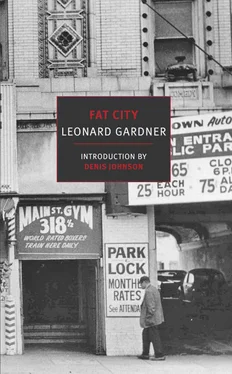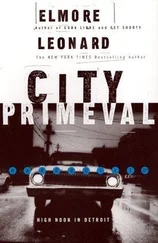Leonard Gardner - Fat City
Здесь есть возможность читать онлайн «Leonard Gardner - Fat City» весь текст электронной книги совершенно бесплатно (целиком полную версию без сокращений). В некоторых случаях можно слушать аудио, скачать через торрент в формате fb2 и присутствует краткое содержание. Год выпуска: 2015, Издательство: NYRB Classics, Жанр: Современная проза, на английском языке. Описание произведения, (предисловие) а так же отзывы посетителей доступны на портале библиотеки ЛибКат.
- Название:Fat City
- Автор:
- Издательство:NYRB Classics
- Жанр:
- Год:2015
- ISBN:нет данных
- Рейтинг книги:5 / 5. Голосов: 1
-
Избранное:Добавить в избранное
- Отзывы:
-
Ваша оценка:
- 100
- 1
- 2
- 3
- 4
- 5
Fat City: краткое содержание, описание и аннотация
Предлагаем к чтению аннотацию, описание, краткое содержание или предисловие (зависит от того, что написал сам автор книги «Fat City»). Если вы не нашли необходимую информацию о книге — напишите в комментариях, мы постараемся отыскать её.
Fat City — читать онлайн бесплатно полную книгу (весь текст) целиком
Ниже представлен текст книги, разбитый по страницам. Система сохранения места последней прочитанной страницы, позволяет с удобством читать онлайн бесплатно книгу «Fat City», без необходимости каждый раз заново искать на чём Вы остановились. Поставьте закладку, и сможете в любой момент перейти на страницу, на которой закончили чтение.
Интервал:
Закладка:
“I’m just sick about it, the way I bungled this thing.”
“Let’s go out and get you something to eat.”
“Not hungry.”
“Come on.”
Tully slid farther under the twisted blankets. “What do you care? I should never listen to you anyway. You’re the one got me into this and now you don’t give a shit.”
“Well, I’m sorry about it, but everything’ll work out for the best.”
“You don’t give a shit about what I’m suffering.”
“Tough, I know. Why don’t I come back tomorrow? I’ll pick you up and take you to the gym. So keep yourself clean. I want you in shape for a workout.”
“You don’t know,” Tully mumbled, and as Ruben went on talking, he pretended to drowse.
The next day Tully lurched down the stairway with his bags. Leaving no message for Ruben, he moved to the Owl Hotel. After resting on the sagging bed, one foot on the floor to slacken a sensation of backward sinking, he went down to the street to approach nourishment obliquely, drinking a Bromo Seltzer at the Old Peerless Inn, then eating a pig’s knuckle. Hours later he returned to the Oxford Hotel and found his key no longer worked.
On the days and nights that followed and became indistinguishable in his memory, he pined for Oma and abhorred his unfathomable stupidity. The thought of existing alone produced instants of vertigo. On waking after a night of arrested falls, hammering heartbeats and sudden breathless staring, he quailed before the emptiness of the day ahead. Without Oma he felt incapable of anything. He could not bear the thought of training, not only because of the effort he could never summon from himself now, but also because the idea of fighting was disorienting in its repugnance. He felt that everyone at the Lido Gym was insane.
One night he awoke sitting up in bed with the dusty curtains, still on their rod, ripped down and covering his head. In his dream he had been accompanying a beautiful woman through a train in search of privacy, until she had disappeared into some compartment and he had run through the car trying doors, meeting only a featureless man, whom he had begun to strike. It was all forgotten in a moment of thrashing panic under the curtains. When he hurled the rod to the floor, a mumbling voice swore beyond the wall.
In the morning waking was like a struggle with death. Exhausted in the dismal sheets, hearing the coughing, the hawking and spitting in other rooms, he sank and rose between consciousness and sleep for nearly an hour before dragging himself up and crossing the cold linoleum to urinate in his washbasin. He was laden with remorse. His life, he felt, had turned against him. He was convinced every day of it had been mislived. His attention dulled, his ears humming, a sense of emptiness and panic hovering about him, he feared he was losing his mind. Catastrophes seemed to whisper just beyond hearing.
After dark he walked by Oma’s hotel and stood below her window until a police car slowly passed. But the following night when he entered the Harbor Inn and saw her with Earl, his first impulse was to turn and go out. His pride took him to the bar, where with studied casualness he had the quick drink of a busy man. He was sure they had seen him. Whenever he glanced at them they were looking away; and he was surprised that Oma did not attract him. He felt nothing, no vengefulness, no familiarity, no desire. He was not even interested. He went out with a sense of relief and was a block away before feeling the impact of the encounter and the shame of his inaction. Later, in bed, he evoked her for a few sad moments with his lips against the sheet.
His jaws bristled with rust-brown stubble. A gray coating covered his tongue like mold. Intending to wash his socks, he postponed washing his feet. And his thoughts all flowed back to regrets. Sometimes, encouraged by signs of tolerance, he bought a drink for someone on a stool beside him; but these companions seemed invariably to lose interest in his unhappiness and he felt his generosity was accepted under false pretenses. One man, in loose pinstripe trousers and Eisenhower jacket, he slammed against a jukebox and chased outside and up the street for an entire block, the pursuit continuing into the next block at a walk, the man glancing back over his shoulder while Tully shouted.
Bemused, he sat in theaters resounding with hoof-beats and gunfire. He paid his rent by the day, then not at all, meeting the bundled and palsied, gray-faced clerk with hearty promises, until one evening there was a different padlock on his door. Downstairs he argued, shouted, hit the counter, and not having the money to redeem them, he left without his bags.
He went to the Azores Hotel, down near the channel, and an old man with broken capillaries puffed up the stairs ahead of him to unlock a cold narrow room. Over the rippled wallpaper on the ceiling were large stains the color of tobacco juice.
When Tully came downstairs into the bleak, stinking bar, lit by unshaded bulbs hanging from long cords above a row of derelicts hunched over glasses, the bartender was roaring at a woman. Her stool stood in a puddle. Waistless, fat-necked, her face and ankles swollen, her bruised legs spotted with scabs, she sat holding her drink in her lap, out of the bartender’s reach, and declared indignantly that she was not going to leave until she finished it.
At noon the next day Tully ate a bowl of oatmeal covered with sugar. He drank coffee sweet as syrup and went on to the Harbor Inn for a glass of wine. Later he bought a fifth and set off to find a warm place to drink it. A cold wind was scuttling papers along the gutters. Dark clouds lay over the delta fields visible to the west beyond the tanks of the gas works that rose from green nettles and fennel and wild oats on the bank of Mormon Slough. In the reeking entrances of vacant storefronts, men in overcoats, sitting on flattened cartons, looked out with rheumy eyes.
Locked in a stall of the men’s room of the public library, Tully sat with his bottle in the same morose stupor that had delivered him from so many days, yearning for Oma, who already had begun to fade from his memory and become fixed and disembodied and eternal in his being. He left after prolonged pounding and finally the intrusion of a custodial face under the stall door.
Out on the street under a turbulent dusk sky, he encountered a flow of pedestrians hurrying from closing stores. Unheeded in their midst, a shouting Filipino evangelist gesticulated with a trumpet. Frail, elderly, and suffering with loose dentures, he stood before a music stand on which, fastened with clothespins, sheets of paper fluttered. Tully, swaying in a wide stance, paused on the corner, and the small man, pacing the street near the curb, zealously harangued him. Understanding nothing but a few recurrent phrases in the torrent of jargon, Tully felt he was being taken for a fool.
“Piss on you,” he said, moving a few steps away to the crosswalk, where, from the curb, he addressed each oncoming pedestrian: “Piss on you and piss on you,” until the evangelist began playing Tea for Two on his trumpet.
Tully was a block away and still hearing those halting notes when it began to rain. His hair and the shoulders of his jacket were soaked before he reached shelter in the nearest bar. There he remained, listening to the splash and beat of the rain, aware of cold windy openings of the door as men entered with upturned collars or went out, feet pounding on the wet pavement. To the conversations on either side or to the room in general he contributed a few remarks: “Just because they’re sitting on that little hair mattress they think they got life by the balls… I served my country… You ought to be ashamed of yourselves… What’s your name?… Better watch yourself…” On rising sea rolls of nausea, his mind lapsed, his head sank to the bar and he drifted in a vast circle. He remained there until impelled to the lavatory; then he tilted slowly over with his stool, crashing painlessly and without sound to the floor. He became aware of hands under his arms as he tried to rise. Upright, gripped around the chest from behind, he was propelled out the door, his protesting voice sounding far away, as if from another room: “Let me alone, I’m all right.”
Читать дальшеИнтервал:
Закладка:
Похожие книги на «Fat City»
Представляем Вашему вниманию похожие книги на «Fat City» списком для выбора. Мы отобрали схожую по названию и смыслу литературу в надежде предоставить читателям больше вариантов отыскать новые, интересные, ещё непрочитанные произведения.
Обсуждение, отзывы о книге «Fat City» и просто собственные мнения читателей. Оставьте ваши комментарии, напишите, что Вы думаете о произведении, его смысле или главных героях. Укажите что конкретно понравилось, а что нет, и почему Вы так считаете.












